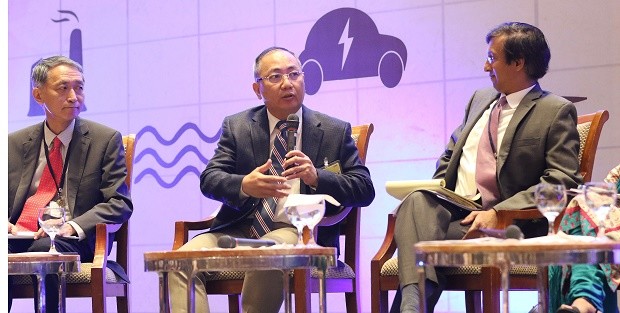
CLEAN ENERGY. Secretary Emmanuel M. De Guzman (center), vice chair of the Climate Change Commission, participates in a panel discussion during the Asia Clean Energy Forum (ACEF) 2016 held at the Asian Development Bank (ADB) Headquarters in Mandaluyong City on June 9, 2016. With him are ADB Senior Advisor for Sustainable Development and Climate Change Department Yongping Zhai (left) and WRI Executive Vice President and Managing Director Manish Bapna (right) (Photo by Rick P. Nicolas). FILE PHOTO AND CAPTION C/O CCC
Despite being recognized as one the leaders of climate-vulnerable countries, the Philippines is still not fully compliant of its own Climate Change Act.
The Climate Change Commission (CCC) on Wednesday said it will remedy this by targeting 100 percent compliance by 2017.
At present, only 9 percent of 1,700 local government units (LGUs) have a local climate change action plan.
CCC Secretary Emmanuel de Guzman, who led the Philippine delegation in the historic climate negotiations in Paris last year, said there is an “urgent and compelling need” to improve how LGUs adapt to climate change.
“Each LGU should have a local climate change action plan (LCCAP) as mandated by the Climate Change Act of 2009. Thus far, out of 1,700 LGUs including provinces, only 160 would have a plan,” De Guzman said in a statement.
READ: Only 10% of LGUs in UN disaster drive
“Based on our timeline, we should have 500 plans by the end of the year and all LGUs; municipalities, cities and provinces should have their own LCCAP by the end of next year,” he said.
The Climate Change Act of 2009 provided for the creation of the CCC, which serves as the sole policy-making body of the government tasked to coordinate and evaluate programs and action plans addressing climate change.
READ: LGUs told climate change funds now P2B
Moral responsibility
De Guzman pointed out that LGU action plans are more than just a requirement of the law but a “moral responsibility.” He said, “Non-action on climate and disaster risks is a social sin and a form of injustice to the poor and the most vulnerable.”
He explained that many poor Filipinos from farming, fishing and informal sectors are vulnerable to climate change as they live in areas exposed to droughts and floods. Such calamities caused by changing weather patterns put crops, livestock and lives at risk.
The Secretary said this is especially problematic for the said sectors who have limited insurance mechanisms and safety nets.
“An LCCAP could well define the strategies of a community for strengthening local risk governance, enhancing rural livelihood, ensuring ecosystems integrity, and building cultural resilience. Implementing these strategies surely reduces disaster risk and builds the adaptive capacity and resilience of communities to climate change impacts,” he said.
Having an action plan will allow LGUs to access the P1-billion People’s Survival Fund that provides for the financing of local adaptation initiatives such as water resources and land management, infrastructure development, and protection of natural ecosystems.
Learning Centers
To further help LGUs, the CCC will launch learning centers, which will teach adaptation and mitigation measures.
“This is part of our national program for convergence where we are promoting and facilitating the convergence of the efforts of national and local government agencies to address climate change especially also to improve the capacity of local governments to comply with the many laws related to climate change,” he said.
The Philippines is one of the signatories of the legally-binding Paris Agreement, which seeks to limit temperature increase to 1.5 degrees Celsius above preindustrial levels. IDL
READ: PH welcomes Paris accord on behalf of climate victims